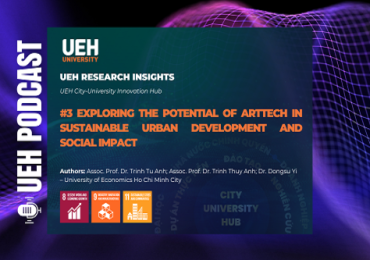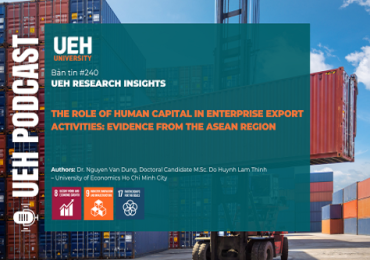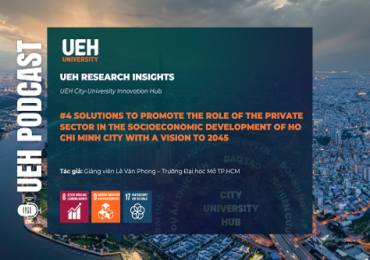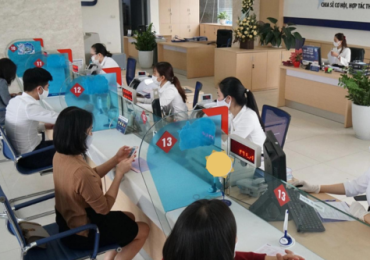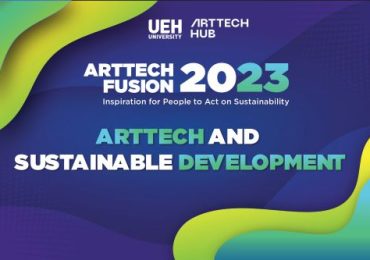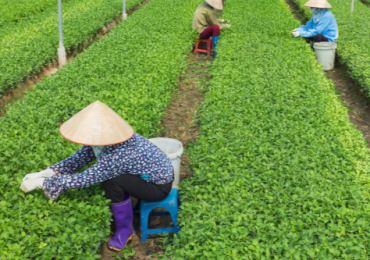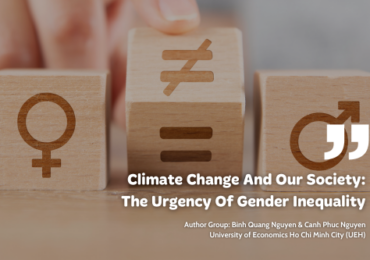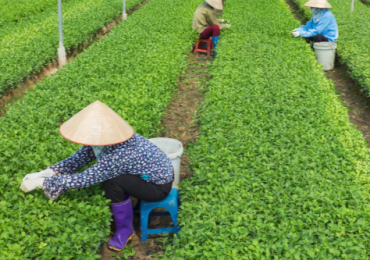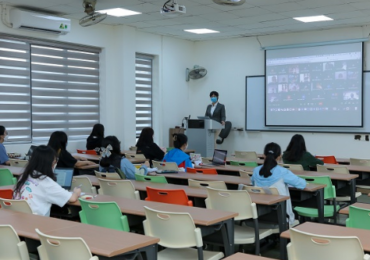[Research Contribution] Decoding the Mechanism of Organic Food Consumption in the Mekong Delta
8 October, 2025
Keywords: Organic food; SOR model; health consciousness; consumer behavior; consumer knowledge
As people increasingly focus on health and nutritional quality, organic food is viewed as a sustainable consumption trend. However, in the Mekong Delta, the level of acceptance and willingness to pay for organic products remains limited. In this research, a team of authors from UEH Mekong, University of Economics Ho Chi Minh City (UEH), employed the Stimulus-Organism-Response (S-O-R) model to clarify the impact mechanism of health consciousness, knowledge, and attitude on consumption intention and willingness to pay for organic food. The research findings have yielded numerous practical implications for businesses in developing the clean food sector in rapidly urbanizing provinces throughout the Mekong Delta region.

In the context of a global shift toward sustainable lifestyles, organic food has become an increasingly popular choice due to factors of safety, environmental friendliness, and health benefits. In Vietnam, organic food has been clearly regulated under Decree 109/2018/ND-CP with a specific certification system. Although the domestic market is still nascent, it is growing, with cultivation area and consumption value continuously increasing. However, organic food consumption behavior in satellite cities and semi-urban areas such as the Mekong Delta remains a research gap.
While numerous studies have addressed the role of health consciousness in organic food consumption, the sequential relationship between consciousness, knowledge, attitude, and behavior has not been clearly validated. In particular, the indirect impact of knowledge and attitude in the decision-making process remains an open question.
This research adopts the S-O-R (Stimulus-Organism-Response) model to explore the impact mechanism of health consciousness and knowledge (S) through attitude (O) on consumption behavior and willingness to pay for organic food (R). The central question posed is: Do knowledge and attitude play the role of important “bridges” to transform health consciousness into actual consumption behavior? By clarifying this chain of impact, the research team expects to contribute to consumer behavior theory in the field of green food, while providing practical implications for developing the organic food market effectively and sustainably.
The research findings reveal that organic food purchasers in the 13 provinces of the Mekong Delta are predominantly female, aged 26-40, with undergraduate education or higher, and monthly income ranging from 8 to 25 million VND. Notably, more than 87% of survey participants indicated they allocate from 11% to 30% of their monthly income to purchasing organic food. This represents a positive signal, reflecting the growing concern of people in the region for health and the quality of food consumed daily.
Using the PLS-SEM model with SmartPLS 4 software, the research team conducted data analysis from 311 consumers in the Mekong Delta. Results show that health consciousness has a strong impact on knowledge and attitude, and attitude is the factor with the greatest direct influence on both consumption intention and willingness to pay.
More importantly, the research demonstrated the statistically significant indirect impact of “health consciousness” on “consumption intention” and “willingness to pay”. Accordingly, the more consumers are conscious about health, the more they will seek information, leading to more positive attitudes and thus readiness to act (having purchase intention and willingness to pay for organic food).
From the research results, the research team proposes several implications to bring organic food closer to consumers in the Mekong Delta region:
First, enhancing education about product knowledge. Because knowledge plays a mediating role, providing understandable, transparent, and scientific information about organic food will help change attitudes and improve consumer purchase intentions. Producers can leverage mass media and social networks to provide information on how to recognize logos and the health benefits and effectiveness that organic food brings, thereby raising the level of awareness and knowledge of organic food consumers among many products. At the same time, it is necessary to provide sufficient product information such as origin, uses, and preparation methods on packaging, and brands can implement promotional programs and discounts to increase interaction between organic food and consumers.
Second, communication centered on health to activate behavior. Results show that health consciousness is an important starting point for forming organic food consumption behavior. Therefore, businesses and policymakers should promote health communication campaigns linked to green, clean, and safe lifestyles for consumers in the Mekong Delta region. Organic food producers and traders need programs introducing the nutritional value of organic food to help consumers clearly understand the health benefits from organic food. Additionally, companies can organize social programs to improve community health and the benefits of using organic food so that the use of organic food is increasingly replicated.
Third, building trust to promote willingness to pay. A positive attitude is a key factor in increasing consumer purchase intention and willingness to pay for organic food. The Mekong Delta has uneven economic development levels among provinces; organic products are not yet sold as widely as conventional food, making it difficult for consumers to access products. Businesses need to build credibility, prove the authenticity of organic certification, and clearly communicate product value so consumers feel it is worth the cost.
Finally, prioritizing target customer groups with moderate to good education and income levels. Research results show that customer groups with undergraduate education and income from 8-25 million VND per month are the core consumer force of the organic food market in the Mekong Delta region. This is also the group with high purchase intention and stable willingness to pay, suitable for positioning targeted marketing campaigns. Therefore, marketing programs, communication, display, and trial encouragement need to be designed appropriate to the demographic characteristics, consumption behavior, and access channels of this group, prioritizing deployment in satellite cities, shopping centers, and modern retail chains.
Meanwhile, the Mekong Delta is a key agricultural region with favorable natural conditions for land, water, and climate, serving as the nation’s strategic organic food production center. Although population density is not as high as in major cities, demand for safe food consumption in satellite cities and provincial centers is still increasing. Therefore, supportive policies are needed for businesses to invest in building local organic supply chains, including developing specialized retail outlets, expanding distribution channels through e-commerce platforms, and strengthening connections between production areas and end consumers. When consumers can easily access, experience, and perceive the value of organic food, positive attitudes will be increasingly reinforced, thereby promoting consumption intention and willingness to pay. This very connection will help the Mekong Delta become not only a production region but also a consumption center and a catalyst for spreading green consumption culture nationwide.
Therefore, the research has clarified the organic food consumption mechanism in the Mekong Delta according to the S-O-R model, emphasizing the role of health consciousness, knowledge, and attitude in forming sustainable consumption behavior. The results not only contribute theoretically to the field of consumer behavior research but also bring practical implications for businesses and organic agriculture development policies.
In the context of climate change and pressure to ensure food security, promoting organic food consumption is not only a personal choice but also a strategic solution toward a green economy and healthy community in the Mekong Delta.
View the complete research article Decoding the Mechanism of Organic Food Consumption in the Mekong Delta According to the S-O-R Model HERE
Author Team: Dr. Truong Thi Hoang Oanh, Phan Ngoc Trinh, Vo Thi Nhu Y, Dao Hong Hue, Tran Ngoc Han – University of Economics Ho Chi Minh City
This article is part of the Research Dissemination and Applied Knowledge Series from UEH with the message “For a More Sustainable Mekong – Toward a Sustainable Mekong Delta,” under the “Research Contribution For All” program implemented by UEH. UEH respectfully invites readers to watch the next UEH Research Insights newsletter.
News, photos: Authors, UEH Mekong Department of Admissions and Communications, UEH Department of Communications and Partnerships
[Podcast] Recommendations for University education development
14 February, 2025
[Podcast] Developing Vung Tau into a World-Class Tourism City
16 January, 2025
[Podcast] Postdigital Design Strategies for Media Art
6 January, 2025
[Podcast] NFTs – Artistic Innovation or Just a New Hype?
27 December, 2024
[Podcast] Boosting Employee Creativity with Constructive Feedback
23 November, 2024
[Podcast] “Dutch Disease” in Remittances and the Case of Vietnam
4 November, 2024
[Podcast] Latest approaches for sustainable universities
11 July, 2024
Data Law – Part 1: Necessity for a New Approach
18 May, 2024
Advertising Evaluation on Tiktok Platform
14 May, 2024
[Podcast] Advertising Evaluation on Tiktok Platform
13 May, 2024
Promoting Learner Autonomy in English Language Learning (Part 1)
24 November, 2023
ArtTech And Sustainable Development
27 October, 2023
Motivation of EFL Vietnamese Students in Economics-related Majors
12 October, 2023
Climate Change And Our Society: The Urgency Of Gender Inequality
12 October, 2023
People Analytics in Vietnam
10 March, 2022
Revolution in Experimental Economics
30 January, 2022
The Sharing Economy: Governance Issues in Vietnam
24 January, 2022
Employment Policy For Ho Chi Minh City in Post-social distancing Period
28 December, 2021
Lifelong learning at UEH: Towards a Sustainable University
28 December, 2021
Building a Decentralized Stock Market based on Blockchain Technology
24 December, 2021
Consumer price index from big data mining perspective (Big data)
17 November, 2021
Overview Of Digital Currency – Part 5: DIEM Private Stabilized Currency
11 November, 2021






